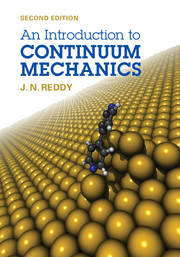Book contents
- Frontmatter
- Dedication
- Contents
- List of Symbols
- Preface to the Second Edition
- Preface to the First Edition
- About the Author
- 1 INTRODUCTION
- 2 VECTORS AND TENSORS
- 3 KINEMATICS OF CONTINUA
- 4 STRESS MEASURES
- 5 CONSERVATION AND BALANCE LAWS
- 6 CONSTITUTIVE EQUATIONS
- 7 LINEARIZED ELASTICITY
- 8 FLUID MECHANICS AND HEAT TRANSFER
- 9 LINEARIZED VISCOELASTICITY
- References for Additional Reading
- Answers to Selected Problems
- Index
9 - LINEARIZED VISCOELASTICITY
Published online by Cambridge University Press: 05 July 2013
- Frontmatter
- Dedication
- Contents
- List of Symbols
- Preface to the Second Edition
- Preface to the First Edition
- About the Author
- 1 INTRODUCTION
- 2 VECTORS AND TENSORS
- 3 KINEMATICS OF CONTINUA
- 4 STRESS MEASURES
- 5 CONSERVATION AND BALANCE LAWS
- 6 CONSTITUTIVE EQUATIONS
- 7 LINEARIZED ELASTICITY
- 8 FLUID MECHANICS AND HEAT TRANSFER
- 9 LINEARIZED VISCOELASTICITY
- References for Additional Reading
- Answers to Selected Problems
- Index
Summary
In questions of science, the authority of a thousand is not worth the humble reasoning of a single individual.
— Galileo Galilei (1564-1642)All truths are easy to understand once they are discovered; the point is to discover them.
— Galileo Galilei (1564-1642)Introduction
Preliminary Comments
The simplest class of deformable solids are thermoelastic solids, which are elastic, nondissipative, and have no memory. When deformable solids also have the mechanism of dissipation, they are termed thermoviscelastic solids, which may or may not have memory. In this chapter we consider thermoviscoelastic solids with memory. When we restrict the case of infinitesimal deformations, then we have linear viscoelastic solids with or without memory.
Constitutive relations for linearized viscoelastic solids can be derived using one of two approaches. In the first approach, the entropy inequality is used to provide guidance. Some of the elements of this approach were discussed in Section 6.6.3, and they are helpful also for viscoelastic solids with memory. The alternative is to use a phenomenological approach, in which the observed physics is incorporated into a mathematical model that does not violate laws of physics, although the entropy inequality does not play a direct role. In this chapter, we consider the phenomenological approach of developing constitutive models for linear thermoviscoelasticity. There are many examples of viscoelastic materials with memory. Metals at elevated temperatures, concrete, and polymers are examples of viscoelastic behavior.
Information
- Type
- Chapter
- Information
- An Introduction to Continuum Mechanics , pp. 389 - 424Publisher: Cambridge University PressPrint publication year: 2013
Accessibility standard: Unknown
Why this information is here
This section outlines the accessibility features of this content - including support for screen readers, full keyboard navigation and high-contrast display options. This may not be relevant for you.Accessibility Information
- 1
- Cited by
